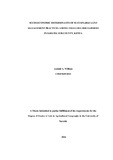| dc.description.abstract | This study investigated the socio-economic factors that determine farmers'
decision to use sustainable land management practices (SLMP) – agroforestry,
terracing, and manure use - aimed at achieving long-term agricultural
productivity in Sabatia Sub-County, Kenya. Four specific objectives were
addressed, namely: (a) to identify the SLMP in the study area; (b) to assess the
effects of farmers' social characteristics on their use of SLMP; (c) to examine
the effects of farmers' economic characteristics on their use of SLMP; and to
establish the impact of use of SLMP on agricultural productivity in the study
area.
The study was guided by two hypotheses that is (i) there is no significant
relationship between farmer‟s social characteristics and use of SLMP. (ii) there
is no significant association between farmer's economic characteristics and
adoption of SLMP. A multi-stage random sampling technique was applied in
selecting farmers to be used in the study. A sample size of 125 farmers
cultivating undulating farms which were deemed most vulnerable to land
degradation was tested in the clusters that were selected. Primary data for the
study was collected through household questionnaire surveys, key informants
interviews, and personal observations while secondary data was obtained from
relevant published and unpublished reports and records. Data was analyzed by
the use of mean, frequency count, percentage, simple regression, chi-square
(χ2) test and stepwise multiple regression analysis.
The study established that smallholders'; membership to farmers' group(s)
gender and farming experience (r = 0.420)had an influenced on their use of
manure while; farm size, annual income, and level of education did not affect
the use of manure among small-scale farmers in Sabatia. Farmers‟ decision to
use terraces and agroforestry was determined by; farm size (r = 0.218), annual
income (r = 0.364), gender, level of education (r = 0.258) and membership to
farmers‟ group(s). The farming experience of the peasants, however, did not
have an impact on terraces and agroforestry in the study area. Use of
sustainable land management practices (SLMP) positively impacted on
agricultural productivity in the study area
The study recommends the need for the government through agricultural
extension officers to mobilize smallholders to embrace the use of SLMP so as
to boost their agricultural productivity. The study further suggests the need to
involve both female and male household heads in the uptake of agroforestry
and terracing. It also recommends the need to boost access to formal education
so as to improve farmers' awareness and use of SLMP. The study also found
out that smallholders should engage more in income generating activities which
are likely to translate into improved use of SLMP. Smallholders are encouraged
to join farmers' groups to improve their awareness and adoption of SLMP.
Initiatives that are aimed at popularizing the use of alternative sources of wood
fuel should be encouraged to reduce deforestation by the smallholders. | en_US |



